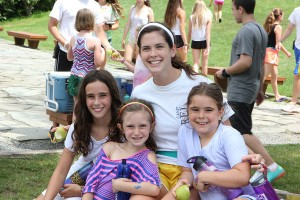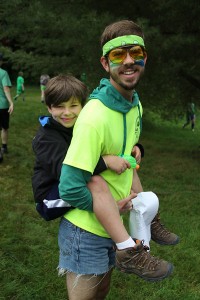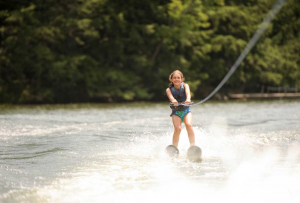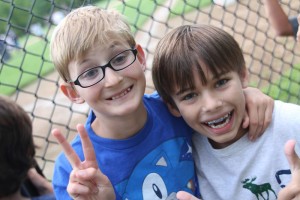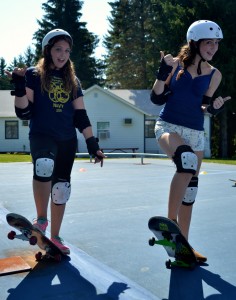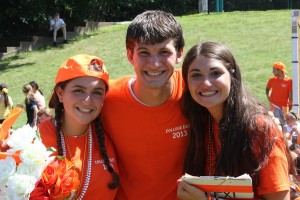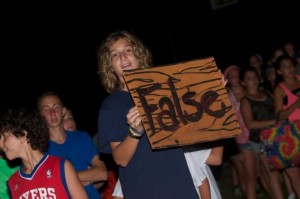 The typical image of evenings at summer camp involves campers sitting around a campfire roasting marshmallows and singing songs. While campfires are an essential part of the camp experience and some camps enjoy campfires nightly or weekly — they’re only the tip of the iceberg when it comes to after dinner activities. While some nights, particularly those following busier than usual days, are “chill” nights at camp during which campers watch a movie, enjoy a camp show or, yes, sit around that infamous campfire, on most nights when the sun goes down at camp, the action heats up and things get crazy—sometimes really crazy—and maybe even a little goofy.
The typical image of evenings at summer camp involves campers sitting around a campfire roasting marshmallows and singing songs. While campfires are an essential part of the camp experience and some camps enjoy campfires nightly or weekly — they’re only the tip of the iceberg when it comes to after dinner activities. While some nights, particularly those following busier than usual days, are “chill” nights at camp during which campers watch a movie, enjoy a camp show or, yes, sit around that infamous campfire, on most nights when the sun goes down at camp, the action heats up and things get crazy—sometimes really crazy—and maybe even a little goofy.
Whether it’s a dance, an evening of games or a scavenger hunt, it’s important to dress for the occasion and costumes are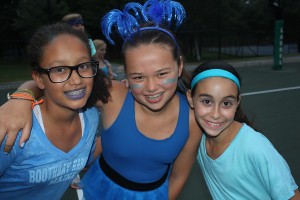 often encouraged. Acceptable attire often includes tutus, crazy hats or wigs, temporary tattoos and face or body paint. When competition is involved, dressing in team colors is also a must. Friends or even entire bunks/cabins often try to mirror each other with matching outfits, and showing team spirit typically becomes a competition within a competition. Clever cheers (often involving inside camp jokes), singing, and loud encouragement provide the soundtrack to a night of activities designed to help everyone let loose, be themselves, and, most importantly, have fun. So what is the point of so much silliness after a full day of activities? It’s simple. Play. Play has long been touted by child psychologists as crucial to social and cognitive development. At camp, however, the kind of play that happens during evening activities takes on a much bigger role as an avenue for inspiring campers and staff alike to embrace camp values and put them into action.
often encouraged. Acceptable attire often includes tutus, crazy hats or wigs, temporary tattoos and face or body paint. When competition is involved, dressing in team colors is also a must. Friends or even entire bunks/cabins often try to mirror each other with matching outfits, and showing team spirit typically becomes a competition within a competition. Clever cheers (often involving inside camp jokes), singing, and loud encouragement provide the soundtrack to a night of activities designed to help everyone let loose, be themselves, and, most importantly, have fun. So what is the point of so much silliness after a full day of activities? It’s simple. Play. Play has long been touted by child psychologists as crucial to social and cognitive development. At camp, however, the kind of play that happens during evening activities takes on a much bigger role as an avenue for inspiring campers and staff alike to embrace camp values and put them into action.
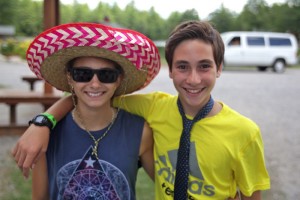 At least one of these three key words consistently appears in camp mottos: “tradition”, “family”, “friends.” All three are emphasized during evening activities at camp. Whether it’s to win a competition or a race, playful evening activities are a fun way for campers to come together as a family to achieve a common goal. More importantly, individual age divisions often spend time together during evening activities. During the day, campers go in many different directions, depending on their interests and program schedules. In the evenings, however, they come back together as a group. In the midst of lighthearted moments, friendships are born and strengthened.
At least one of these three key words consistently appears in camp mottos: “tradition”, “family”, “friends.” All three are emphasized during evening activities at camp. Whether it’s to win a competition or a race, playful evening activities are a fun way for campers to come together as a family to achieve a common goal. More importantly, individual age divisions often spend time together during evening activities. During the day, campers go in many different directions, depending on their interests and program schedules. In the evenings, however, they come back together as a group. In the midst of lighthearted moments, friendships are born and strengthened.
Sleepaway camp traditions don’t begin and end with campfires and sing-alongs. They are evident—or sometimes born—in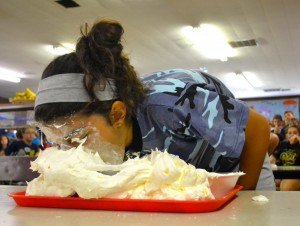 even the wackiest moments of evening activities. Those activities become perennial favorites to which campers look forward all year. They spend time during the winter contemplating ways in which they can enhance tradition and future memories by building upon previous experiences of those activities. They communicate with each other, brainstorm ideas and even make plans. In short, through play, campers take ownership of their camp experience as well as their camp traditions. In doing so, they embrace camp values.
even the wackiest moments of evening activities. Those activities become perennial favorites to which campers look forward all year. They spend time during the winter contemplating ways in which they can enhance tradition and future memories by building upon previous experiences of those activities. They communicate with each other, brainstorm ideas and even make plans. In short, through play, campers take ownership of their camp experience as well as their camp traditions. In doing so, they embrace camp values.

 570-798-9831
570-798-9831
